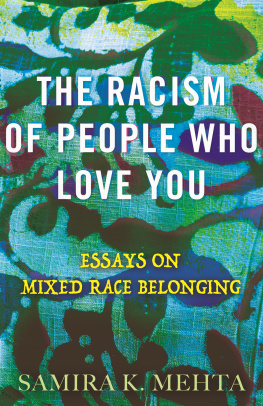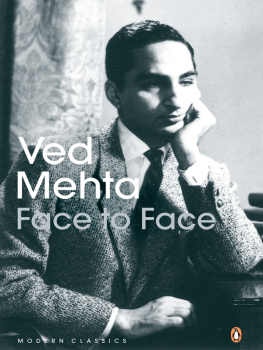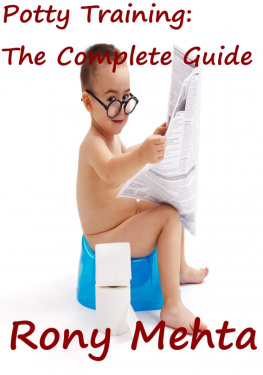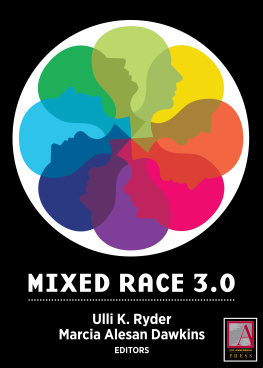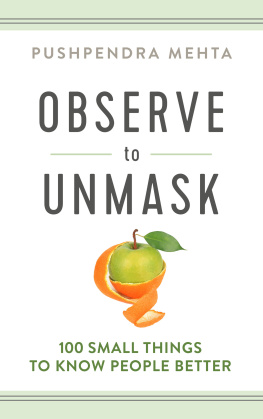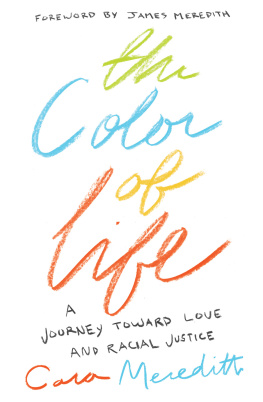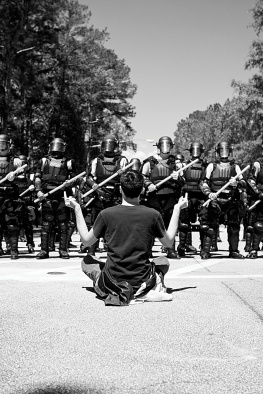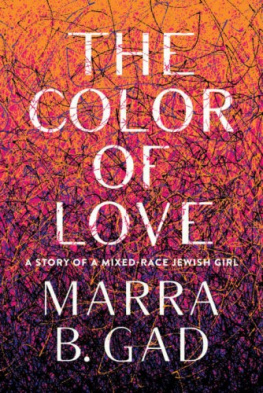Contents
Pagebreaks of the print version
Guide

To Matteo
with hope for his future
and with love from his aunt.
AUTHORS NOTE
T elling your own story is a complicated thing, in part because how you might tell a story changes over time, and in part because other peoples lives are intertwined. Not only is there no way to tell ones own story without telling other peoples storieswe also each remember different things and remember them through our own perspectives. I can imagine other people remembering the events that I write about differently. That is, for better or for worse, how memory works. In part because of those differences, and to protect people who might not want their stories told, I have not named the majority of my relatives. Indeed, I have seventeen aunts and uncles, and that is before you start counting my parents cousins and close friends, all of whom (in the Indian context at least) are also aunts and uncles. Not only have I not named all of these relatives, I have sometimes conflated themcreated composites, precisely to avoid telling any one persons story.
For other people, I have made a variety of choices. I have used the names of people who have given me permission to do so, like my friend Jimmy, or if they are not mentioned at length. Other times, I have simply described the relationshipthis half-Asian friend, or that one; this mentor, who offered insight as someone who is also mixed; that mentor, who mentored across racial difference. In these cases, I wanted to spare the reader the need to keep track of a cast of characters, and also to preserve the anonymity of people who may have offered advice or told stories in a given moment or context, advice that mattered to me but that they might (or might not) remember and subscribe to today.
In only one case, that of my friend James, have I created a fictitious name, and once again, I am grateful to him for agreeing to have the story told.
INTRODUCTION
I started thinking about, and then writing, these essays in 2016, in the run-up to and then the aftermath of the election. I had been playing with some of the ideas for a while when, as I write in the titular essay, I went out to dinner with a very old friend. He was, as we all were, painfully aware of how much xenophobia the Trump campaign incited; whether because the campaign had created it with propaganda, or whether it simply empowered bigots to say what they were thinking, I still do not know. Indeed, by the time we had this dinner, a month or two before the election, I had twice been spit on and told to go home while shopping at my local grocery store, about an hour and a half outside of Philadelphia. We were discussing the question of whether I would move into the city and commute, in part to live in a place where I felt safer as a woman of color. That said, cities would prove not to feel completely safe: before the inauguration, I would be spit on while riding the metro on my way to Reagan National Airport in Washington, DC, as I flew to a conference in Rochester, New York. On that same trip, at the airport for my return flight, the Rochester TSA would go through every item in my carry-on, holding up dirty pair of panties after dirty pair of tights. Two young, nonbinary Canadians, traveling from the same conferences, would see this happening to me, and sit themselves down, with their eyes closed to protect me from embarrassment, until they knew I was safe.
My friend was horrified by the racism that I was experiencing and, as a white ally, wanted to give me space to talk about it. But as I was talking to him, I found myself trying to explain that the racism that hurts me the most is not the racism that scares me the most. Its not the racism that comes with confederate flags or that makes me fear for my safety. Rather, its the racism of people who love me, the racism that I dont know how to see, or talk about, or name, and that because I cant quite name it as racism, it often ends up making me feel crazy.
In thinking about this kind of racism, its important to name that I am a person of multiple heritages. My father was South Asian, as are all of his relatives, and my mother is a white midwestern American. In some ways, then, this is the story of moments when my white family and the friends that I have made through a life lived in Primarily White Institutions have been, however unintentionally, sources of racism in my life. Its hard to name these things as racism, because they are not often deliberate and because sometimes they look simply like interpersonal conflict. And that is why it is important to note that for me, even when my family doesnt realize it, often when I do not realize it, my ways of being in the world draw from multiple cultures and heritages. That does not mean I am always rightas my therapist could attest, I am someone who is deeply and anxiously preoccupied by the times when I have likely been wrong. It does, however, mean that racial and cultural difference come into the most intimate spaces of life.
Identifying with multiple heritages is increasingly common in the United States. According to the United States census, in 2010, 2.9 percent of the population reported multiracial heritage, while in 2020, 10.2 percent of the population did. That percentage jump represents some 17.6 million people, an increase of more than 1,000 percent. Some 2.7 million of those people are like me, half-white and half-Asian. (It is important to note that while this number almost certainly reflects a change in the number of actual mixed race people, it also may reflect changes in how people report. While I cannot remember how I, personally, filled out my census forms, I know that I sometimes claim mixed heritage, and at other times, thinking about my name and my skin color, simply claim to be South Asian or Asian.) For a sense of proportion, the Pew Foundation estimates that American Jews make up 2.4 percent of the population, at about 5.8 million adults. I do not say this to diminish the importance of American JewsI am, after all, a scholar of American Jewish culture. I say this more to point out that, if there are only slightly more than double the number of Jews than there are half-whites/half-Asians, our stories, important in and of themselves, are also culturally important. Even more so if there are commonalities as well as differences across mixed race experiences. Having, and claiming, multiple heritages is increasingly part of the American experience, but based on the multiple-heritaged folks that I have met through social media, it is increasingly part of the human experience.
Of course, while I am suggesting that there are (probably) commonalities across mixed experiences, and while I experience some of those commonalities while talking with friends who are Italian Mexican American, Scots Mexican, Korean Irish, Indian Cuban, Anglo-American, Chinese Irish, and Irish Iranian, there are also differences. Sometimes these differences come from how you are racializedthe history of the one drop rule in the United States makes it very different to be Black and something else than to be white and something else. And, of course, what those other things are matter a lot as well, as does where and how you were raised. (This range of experience can be seen in Failing the Authenticity Test, where I contrast my experience growing up on the edges of an Indian immigrant community to those of my Korean Irish friend Jimmy, growing up on military bases where almost everyone who was Korean had a Korean mom and white, Black, or brown American dad.)

